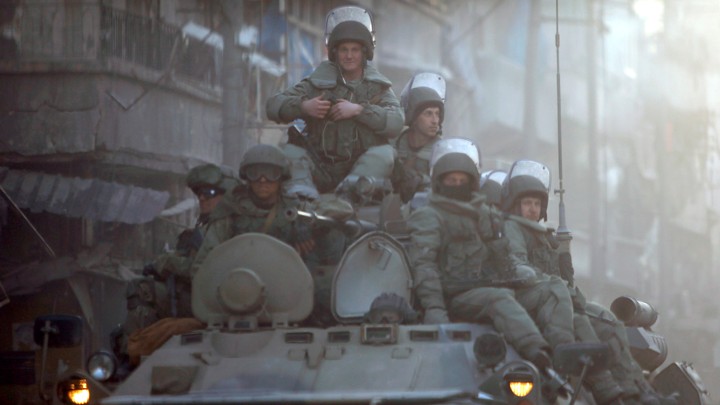PBS: Escaping Eritrea … [Read More...] about ካብ ውሽጢ ቤት ማእሰርታት ኤርትራ
Russia’s Favorite Mercenaries
Neil Hauer | 27 August 2018 | The Atlantic
Wagner, the elusive private military company, has made its way to Africa—with plenty of willing young Russian volunteers.

In Russia, journalism is far from the safest profession—even more so when the subject of investigation happens to be a private mercenary army engaged in multiple active conflicts abroad. On July 30, three Russian journalists were killed in the Central African Republic (CAR) while investigating a particularly dangerous topic: the Russian private military company Wagner, a mercenary outfit highly active in the Syrian and Ukrainian conflicts. At least two other Russian journalists have also suffered while researching Wagner, including Maxim Borodin, who suddenly fell to his death from a balcony in Yekaterinburg in April, and Denis Korotkov, a Saint Petersburg journalist forced into hiding after receiving death threats owing to his work on Wagner. There are now indications that Wagner forces may be present with both rebels and government forces in CAR. A unit of the group, filmed by the recently deceased journalists, was operating in rebel-held territory—contrary to Moscow’s assertions that Russian forces were present only to assist CAR authorities.
While Wagner attempts to suppress investigations into its activities, the information available suggests an outfit that plays an increasingly crucial role for Moscow both abroad and at home. But even as this strategy has allowed Russia to rack up military successes without risking its own ground forces, it has also created an explosive situation: Skilled soldiers of fortune who take their orders from an oligarch—not from the Kremlin—are playing a central, unpredictable role in shaping Russia’s foreign policy.
Though the exact nature of Wagner’s relationship to the Kremlin remains murky, it has demonstrated a growing ability to create headaches for Russian authorities. Its origins date back to 2013, when an earlier iteration of Wagner known as the Slavonic Corps engaged in a disastrous mission to Syria at the behest of unknown Damascene businessmen. One of the commanders of the Slavonic Corps, a former Russian military intelligence (GRU) colonel named Dmitry Utkin, reemerged shortly thereafter in early 2014, fighting in eastern Ukraine at the head of a GRU-linked outfit called PMC Wagner. It played a pivotal role in major battles there, working closely alongside Russian military forces and their separatist proxies over the next year and a half.
Though the exact nature of Wagner’s relationship to the Kremlin remains murky, it has demonstrated a growing ability to create headaches for Russian authorities. Its origins date back to 2013, when an earlier iteration of Wagner known as the Slavonic Corps engaged in a disastrous mission to Syria at the behest of unknown Damascene businessmen. One of the commanders of the Slavonic Corps, a former Russian military intelligence (GRU) colonel named Dmitry Utkin, reemerged shortly thereafter in early 2014, fighting in eastern Ukraine at the head of a GRU-linked outfit called PMC Wagner. It played a pivotal role in major battles there, working closely alongside Russian military forces and their separatist proxies over the next year and a half.
Syria’s war has never been more international
After proving its mettle in Donetsk, Wagner joined Moscow’s official intervention in Syria shortly after it began in September 2015, playing a leading role in the capture of Palmyra and Deir ez-Zor. Wagner has functioned as an undeclared branch of the Russian military: Its fighters fly to Syria on Russian military aircraft, receive treatment in Russian military hospitals, work alongside regular Russian forces in operations, and are awarded Russian military medals signed personally by Vladimir Putin. Backed by Russian airpower, Wagner fighters have been instrumental to the Syrian government’s reconquest of much of its territory, spearheading assaults against entrenched Islamic State positions in lieu of ineffective Syrian militias.
While Russia has long histories with Ukraine and (to a lesser extent) Syria, nothing of the sort can be said of central Africa, Wagner’s present area of focus. Following talks between Russia and Sudan on security cooperation late last year, a video emerged showing Russian contractors training local pro-government militia in the country. Then, in March 2018, the Kremlin issued a statement that 170 “civilian advisors” (widely understood to mean Wagner forces) had arrived in CAR to train government forces. At the end of July, another 500 alleged Wagner fighters appeared on the Sudan-CAR border. There are persistent rumors of their current or future presence in Libya, with one Wagner commander stating in March that his fighters would soon head there. These developments seem to confirm reporting from a Russian journalist who, in March, posed as a Wagner recruit to access its main training base in southern Russia. “Half our guys are preparing for Africa,” he was told.
Sub-Saharan Africa probably isn’t a dream destination for Russian fighters, but a hefty financial incentive smooths that over. While the average Wagner paycheck fell last year by a third from its initial value (240,000 rubles monthly, or roughly $3,550), the current rate of 160,000 rubles still far outpaces the typical wages in provincial Russia. Interviews with families of deceased Wagner fighters, many of them drawn from central Russia’s dilapidated Ural region, have confirmed the group’s monetary allure.
